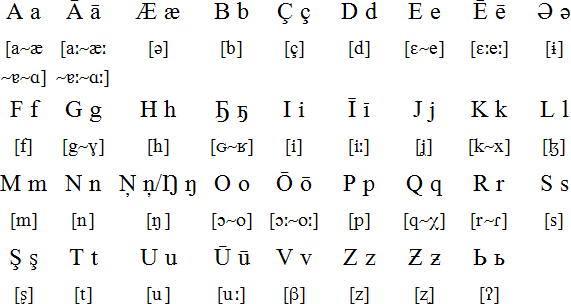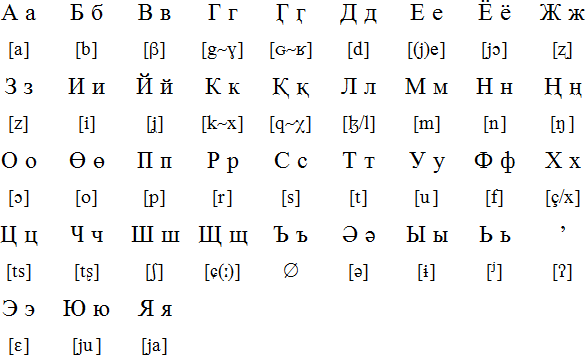Ket is the last surviving member of the Yenisei family of languages. It is spoken along the Yenisei River and its tributaries in Central Siberia. In 2010 there were 210 speakers. The majority of speakers were older adults, and few Ket speakers were raising their children to speak the language. There were no known monolingual speakers. In 2017 there were no remaining fluent Ket speakers.
Ket is also known as Yenisei-Ostiak or Ostyganna qa'. It is related to Yugh or Yug, which became extinct in the 1970s, and Pumpokol, Arin and Kot, which became extinct during the 18th and 19th centuries. These languages are thought by some linguists to be related to the North-Caucasian and Sino-Tibetan languages. Others, such as Edward Vajda, a historical linguist at Western Washington University, believe they are related to the Na-Dené languages of North America.
Ket is taught as a subject in some primary schools up to the fourth grade. After that only Russian is taught.
This spelling system using the Latin alphabet was developed in the 1920s and 1930s by N.K. Karger, who publised the first Ket alphabet primer.

This Cyrillic-based system was developed in the 1980s by G.K. Verner and G.H. Nikolayeva.

Download an alphabet chart for Ket (Excel)
Details provided by Michael Peter Füstumum
Анари там қорэсь, а бән, бән, анари богон мордушка лёңлюбет. Абась богон доʼң қимсен, қогэт ыксь. Таң кысьн. Таң кысьн. Қaт богон наʼнь ат кайнем, мордушка наʼнь ат кайнем
Source: http://siberian-lang.srcc.msu.ru/ru/text/mordushka-g-m-baldin
The day before yesterday ... or yesterday ... but no, no, the day before yesterday I went to check the muzzle. Three women and one man went with me. All Russians. All Russians. Well, I went took the bread. I took bread for the face.
Information about Ket | Numbers
Information about the Ket language
http://en.wikipedia.org/wiki/Ket_language
https://ru.wikipedia.org/wiki/Кетский_язык
https://lingsib.iea.ras.ru/en/languages/ket.shtml
https://blog.chrishaughton.com/a-bit-lost-in-the-siberian-ket-language/
https://www.scribd.com/doc/176792134/Descriptive-Grammar-of-Ket-Georg-pdf
Adamaua Fulfulde, Afrikaans, Arabic (Algerian), Arabic (Bedawi), Arabic (Chadian), Arabic (Egyptian), Arabic (Gulf), Arabic (Hassaniya), Arabic (Hejazi), Arabic (Lebanese), Arabic (Libyan), Arabic (Modern Standard), Arabic (Moroccan), Arabic (Najdi), Arabic (Sudanese), Arabic (Syrian), Arabic (Tunisian), Arwi, Äynu, Azeri, Balanta-Ganja, Balti, Baluchi, Beja, Belarusian, Bosnian, Brahui, Chagatai, Chechen, Chittagonian, Comorian, Crimean Tatar, Dargwa, Dari, Dhatki, Dogri, Domari, Gawar Bati, Gawri, Gilaki, Hausa, Hazaragi, Hindko, Indus Kohistani, Kabyle, Kalkoti, Karakalpak, Kashmiri, Kazakh, Khowar, Khorasani Turkic, Khwarezmian, Konkani, Kumzari, Kurdish, Kyrgyz, Lezgi, Lop, Luri, Maguindanao, Malay, Malay (Terengganu), Mandinka, Marwari, Mazandarani, Mogholi, Morisco, Mozarabic, Munji, Noakhailla, Nubi, Ormuri, Palula, Parkari Koli, Pashto, Persian/Farsi, Punjabi, Qashqai, Rajasthani, Rohingya, Salar, Saraiki, Sawi, Serer, Shabaki, Shina, Shughni, Sindhi, Somali, Soninke, Tatar, Tausūg, Tawallammat Tamajaq, Tayart Tamajeq, Ternate, Torwali, Turkish, Urdu, Uyghur, Uzbek, Wakhi, Wanetsi, Wolof, Xiao'erjing, Yidgha
Abaza, Abkhaz, Adyghe, Aghul, Akhvakh, Akkala Sámi, Aleut, Altay, Alyutor, Andi, Archi, Assyrian / Neo-Assyrian, Avar, Azeri, Bagvalal, Balkar, Bashkir, Belarusian, Bezhta, Bosnian, Botlikh, Budukh, Bulgarian, Buryat, Chamalal, Chechen, Chelkan, Chukchi, Chulym, Chuvash, Crimean Tatar, Dargwa, Daur, Dolgan, Dungan, Enets, Erzya, Even, Evenki, Gagauz, Godoberi, Hinukh, Hunzib, Ingush, Interslavic, Itelmen, Juhuri, Kabardian, Kaitag, Kalderash Romani, Kalmyk, Karaim, Karakalpak, Karata, Karelian, Kazakh, Ket, Khakas, Khanty, Khinalug, Khorasani Turkic, Khwarshi, Kildin Sámi, Kili, Komi, Koryak, Krymchak, Kryts, Kubachi, Kumandy, Kumyk, Kurdish, Kyrgyz, Lak, Lezgi, Lingua Franca Nova, Lithuanian, Ludic, Macedonian, Mansi, Mari, Moksha, Moldovan, Mongolian, Montenegrin, Nanai, Negidal, Nenets, Nganasan, Nivkh, Nogai, Old Church Slavonic, Oroch, Orok, Ossetian, Pontic Greek, Romanian, Rushani, Russian, Rusyn, Rutul, Selkup, Serbian, Shor, Shughni, Siberian Tatar, Sirenik, Slovio, Soyot, Tabassaran, Tajik, Talysh, Tat, Tatar, Teleut, Ter Sámi, Tindi, Tofa, Tsakhur, Tsez, Turkmen, Tuvan, Ubykh, Udege, Udi, Udmurt, Ukrainian, Ulch, Urum, Uyghur, Uzbek, Veps, Votic, Wakhi, West Polesian, Xibe, Yaghnobi, Yakut, Yazghulami, Yukaghir (Northern / Tundra), Yukaghir (Southern / Kolyma), Yupik (Central Siberian)
Languages written with the Latin alphabet
Page last modified: 20.09.21
[top]
You can support this site by Buying Me A Coffee, and if you like what you see on this page, you can use the buttons below to share it with people you know.

If you like this site and find it useful, you can support it by making a donation via PayPal or Patreon, or by contributing in other ways. Omniglot is how I make my living.
Note: all links on this site to Amazon.com, Amazon.co.uk
and Amazon.fr
are affiliate links. This means I earn a commission if you click on any of them and buy something. So by clicking on these links you can help to support this site.
[top]